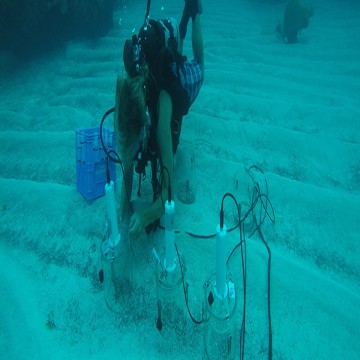Research Highlight: Acid Ocean Poses Increased Reef Loss Risk
Scripps
Scripps researcher Tyler Cyronak and test chambers in a study of ocean acidification effects on coral reef sediments in Bermuda
Much of the sediment that serves as the foundation of most coral reef ecosystems could begin to erode within 30 years as a result of increasing ocean acidity, according to new research.
Scientists at Scripps Institution of Oceanography at the University of California San Diego, are part of a study led by Australia’s Southern Cross University that found that sands that provide material for the building and maintenance of some coral reef ecosystems face a decline. Calcium carbonate, a key reef building block, may dissolve faster than it is being produced. The researchers conclude that this dissolution will exacerbate reef loss, and in some regions such as Hawaii it has already begun.
“Coral reef sediments around the world will begin to dissolve when seawater reaches a tipping point in acidity – which is likely to occur well before the end of the century,” said study lead author Professor Bradley Eyre from Southern Cross University’sCentre for Coastal Biogeochemistry.
Ocean acidification is a consequence of the use of fossil fuels and other human activities that have raised levels of the greenhouse gas carbon dioxide to the highest in human history. The oceans absorb a portion of the CO2 emitted into the atmosphere, after which the gas is converted into different chemicals that include carbonic acid. As seawater CO2 increases, the pH falls and it becomes more difficult for shell-forming organisms to create calcium carbonate.
The study, “Coral reefs will transition to net dissolving before end of century,” appeared Feb. 23 in the journal Science. Co-authors include Scripps chemical oceanographers Tyler Cyronak and Andreas Andersson.
The researchers placed chambers on the seafloor at five reef locations in the Pacific and Atlantic Oceans to measure the impact of future seawater acidity in dissolving the sands that make up coral reef systems.
“It was surprising how consistent the response of sediment dissolution to increasing CO2 was across a range of different sand types within different coral reef ecosystems,” said Cyronak, a postdoctoral researcher at Scripps. “Despite physical and chemical differences between the reef sites, dissolution rates of the sands were consistently more sensitive to ocean acidification than coral calcification was.”
The researchers noted that the results do not necessarily mean that entire reefs will dissolve as corals will continue to calcify.
“If you think of calcium carbonate production and dissolution as making deposits or withdrawals to a savings account, our results suggest that withdrawals will exceed deposits in the next few decades. The consequences, however, will depend on both the size of savings and the difference between deposits and withdrawals,” said Andersson.
The authors also note that coral reefs are especially vulnerable ocean ecosystems as ocean warming and coral bleaching threatens reefs’ ability to produce calcium carbonate. In addition, their proximity to land masses exposes them to runoff of organic matter from terrestrial sources. The organic matter tends to lower seawater pH faster, especially in sediments where organic matter is broken down by microbial respiration.
– Robert Monroe (portions adapted from Southern Cross University release)

